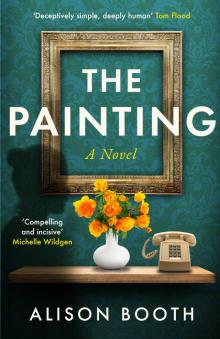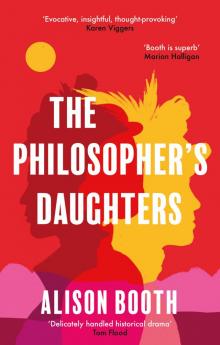- Home
- Alison Booth
The Philosopher's Daughters Page 7
The Philosopher's Daughters Read online
Page 7
She steeled herself to glance at his face once more. He looked peaceful. It was as she thought: he had gone peacefully.
He had gone.
Now she understood what she’d lost, and tears began to stream unchecked down her face. ‘How can he have gone like this?’ she wailed when Rose returned from making her phone call. ‘Where has he gone?’
Harriet felt Rose put her arms around her. Leaning into Rose’s embrace, she let herself be enveloped by her warmth, her bulk. Then Rose said, ‘I’m sure he’s gone to heaven, Miss Harriet. He always was a good man.’
‘There is no heaven, Rose!’ But if only she could retrieve her words, for a belief in heaven might sustain Rose even if it were of no comfort to her. She burst into shrieks of what might be interpreted as laughter were it not so hysterical. Though Rose remained silent, her arms tightened around Harriet. Soon they heard the ringing of the front door bell – Charles’ characteristic four rings.
‘Thank God for Charles,’ said Harriet, as they both struggled to their feet.
Her remarks showed religious inconsistency; she could hear her father’s voice saying this to her, with the teasing – if not detached – amusement that he always displayed when correcting any lapse of logic. His comments would for ever be in her head. Despite her shock, she was able to see in sharp clarity this simple truth.
Rose showed Charles in. Without thinking, Harriet flung her arms around his neck and rested her face against his shoulder. After a few seconds she became aware of his reserve. She stiffened and withdrew her arms; she quelled her display of emotion. She wasn’t behaving like a lady; she wasn’t behaving like one of her class. She stepped back a pace and looked at Charles’ face. Shock and sadness were displayed there. Perhaps he was as devastated as she, so devastated that he had nothing to give and was unwilling to take anything either. For an instant she felt a surge of anger. It was her father who had gone and not Charles. Surely he could show some warmth. But then she looked into his sad, dark eyes and felt compassion for this man who was unable to reveal his feelings.
This emotion was quickly overwhelmed by desolation. She felt it wrench at her stomach, as if she were going to vomit up all that she had absorbed in the past hour or so. She needed to purge herself; she wanted to go back to life as it was when she and her father were about to go out for the evening. ‘I’ll phone Violet and Aunt Charlotte,’ she said.
‘Would you like me to take care of the funeral arrangements?’
‘Yes, thank you Charles.’ This was how Charles gave, she thought. He’d loved Father too and could only show this in practical terms. She was more grateful than she could say for his offer.
Chapter 12
‘The Telegraph Boy is Waiting’
Afterwards, years afterwards, Sarah would be able to remember every detail of the moment before she received the news. The image she would carry was like a picture postcard: the breakfast table on the lawn a last supper, the sky a too-deep blue, the magnolia tree covered with plump white buds and the azaleas already in flower in the dense shrubbery behind Henry, although the season was autumn and they shouldn’t come out until spring.
And the maid Emily, dressed in black, standing immovable in front of Sarah, a part of the tableau. Holding out her hand with the telegram resting flat on her palm, as if it were a tray of seed for the birds, as if that were the reason she was extending her arm. Sarah kept perfectly still and waited for the little blue wrens darting through the bushes to land on Emily’s hand.
‘The telegram is for you,’ Emily said.
‘I can’t open it,’ Sarah said to Henry. ‘You do it. It’s bad news, I know.’
‘You can’t know that.’
‘I have a feeling.’ Hoping she was wrong, she watched Henry rip open the envelope and read the contents.
‘It’s from Harriet,’ he said, and hesitated.
She listened to the laughing of a kookaburra from a eucalyptus tree further up the point. ‘Go on, Henry.’
‘She says, ‘DEAREST SARAH FATHER DIED PEACEFULLY IN HIS ARMCHAIR STOP FUNERAL NEXT WEEK STOP PLEASE ADVISE.’
‘Please advise what?’ Sarah was so pervaded with a sense of unreality that she could focus only on that part of the message over which she had some control. Although she’d expected bad news, she hadn’t anticipated this. Aunt Charlotte was what she’d thought, not Father.
‘I suppose if you’ve got any opinions about the funeral arrangements.’
Sarah glanced at Henry, who was standing next to her chair looking rather anxiously at her. When she held out her hands he pulled her up and drew her close.
The maid coughed. ‘A reply-paid telegram,’ she said. ‘The telegraph boy is waiting.’
‘We’d better tell him something,’ said Henry. ‘Shall I do it?’
‘Yes. You’ll know what to say. Send all my love to poor darling Harriet and say that I’ll leave the arrangements to her judgement.’
‘I suppose your Aunt Charlotte is helping Harriet,’ said Henry. ‘And Charles too.’
Sarah, watching him pace up and down the scrappy lawn, thought of how devastated Harriet would be. Her whole life revolved around Father. She worked for him, she worked with him. Sarah wished she could be with her to share this loss. But it was impossible. This distance was impossible.
Henry was still struggling to compose a reply. ‘Perhaps I’ll say “Letter follows.” No. “Message follows. Message and letter follow. Sympathy and love. Arrangements to your judgement…’” Something like that. Maybe that will do.’ He hurried inside to deal with this response before its form escaped him.
Sarah held on to the edge of the breakfast table and looked at her hands. Her father’s hands; perhaps the only physical characteristic of his that she had obviously inherited. She inspected them dispassionately while she thought over the news. One minute she had a father, the next minute she didn’t. Just like that. And for the moment she had no reaction apart from heightened powers of observation.
After finishing her cup of cold coffee, she walked down to the water’s edge. Still she felt nothing but saw everything. Small waves were slapping against the sandstone shelf, the wake from a ship that was being towed down the harbour towards the heads by a fussy little tug. A water bird with lanky legs and a bowed black beak inclined its head at her approach, before ambling away.
Father had gone. She thought of the passage of the seconds, the minutes, as if they were almost tangible. Time ticked relentlessly on while she remained behind, stranded beside the harbour in a state of disbelief. It was impossible to believe, it was impossible to admit, that she’d never see him again.
When she saw Henry come out of the house, she ran across the grass, almost tripping in her haste. She desperately wanted to hold him, to have him hold her. She didn’t at first notice the wine glass he was holding, until he said, ‘Whoa, girl,’ as he sometimes did, as if she were a horse. ‘Have a spot of brandy,’ he said, and held the glass up to her lips. ‘Drink it all at once.’
It was a hug she wanted, not a tot. She might have batted his hand away if she hadn’t felt too weak. Swaying slightly, she swallowed the brandy that he forced between her lips and spluttered at its harshness.
Almost immediately she began to feel light-headed, with a wilting sensation in the small of her back, as if her spine might suddenly give way. ‘You should rest,’ said Henry. ‘We’ll lie down together for a while.’
He led her inside, out of the sunlight that she now found too stark, that was exposing too much, and into the darkness of their bedroom, where the curtains were still drawn. He gently pushed her on to the bed, on to the white counterpane, and lay down next to her. He held her close until at last the import of the telegram penetrated her brain, penetrated her defences, and she began to cry, quietly at first, the sound muffled against his shoulder.
Afterwards Henr
y began to talk. Sarah rested her head against his chest and listened to the reverberation of his voice. Soon she fastened on to his words too. They emerged at first haltingly but then he began to shape them into a eulogy, into an interpretation of her father’s life. He told her of her father’s delight in his daughters, and of his work that was so clever it had influenced a whole generation of thinkers. Here Henry faltered for a moment and then took an enormous breath – Sarah could hear the air swishing into his lungs – before carrying on with his words of comfort. Her father’s legacy was in his daughters and in his books, and in his former students too. His memory would live on in them.
Sarah no longer wondered at the difference between Henry’s communication with her and his more casual and sometimes inarticulate conversation with acquaintances. Together they could achieve a rapport that was impossible with others. She tilted her head back so she could look at Henry’s face. His eyes were closed in concentration and his forehead slightly furrowed.
She listened to Henry repeat some of the anecdotes that he’d heard from her in the past, and then to elaborate on some of his own experiences of James Cameron from their first meeting. After a time, she felt herself drifting off. Like a boat in a deep river, she was insulated by his meandering conversation, by his love, from what was happening on the shore. Later she would have to deal with it, but for the moment she would escape into sleep.
Chapter 13
‘I Am Reminded of Father’
In her father’s study, surrounded by his books, Harriet felt closer to him than anywhere else in the house. Though his presence was strong in the drawing room, there was always that empty chair with the hollow in the middle that no amount of plumping and shaking could remove. There was that absence of papers too; no books or drafts of articles piled up and waiting to be read. Sitting at his desk now, she was partway through writing to Sarah. For once she wasn’t finding it easy. Again she read what she had written.
My dearest Sarah,
How I long for a letter from you but still none has come, although I know you will have written to me as soon as you heard the news, as you said you would in your telegram.
Everyday things are so painful now. One forgets for a while that Father is dead, and then it all comes flooding back. I’m reminded of him each time I go into the drawing room and he’s not there in his usual chair, although there’s still a dent where he used to sit, so that it seems as if he will return to the room at any minute, as if he has merely gone into his study to take down another book.
I’m reminded of him when I walk the streets, as I often do now, feeling the need to walk myself into a profound exhaustion so that I can get some sleep at night, and then I remember that he won’t be at home when I return. I’m reminded of him when I walk through the parks, past the clumps of daffodils that are flowering so very late this year. Daffodils that remind me of being a child in Oxford, secure in Father’s protection, the spring there so sweet in my memory, with the great swathes of narcissi that grew in our garden that you and I picked in armfuls – do you remember?
When I think of our past, our childhood, my memories of Father are intricately mixed up with places, are firmly attached to places. As I grew up, I was always profoundly aware of my own changes, each stage an apparently unique development; but I was less aware that Father was changing too, that he was ageing. And I never thought, I never thought much at all, about changes within Father, that he too might have been changing, maturing, evolving, the way you and I have been all our lives, always in a state of flux.
The people one loves grow and mature, deteriorate and then they must die. People are in a state of flux, the world is in a state of flux. But in my memory the places of our childhood are fixed points. These are sacred places, seen with the innocence of youth, in the security of Father’s protection and love; these are hallowed places to me. These past few weeks I have been remembering Father, deliberately pulling out my memories to cherish, and to construct the average memory of him in which I want an equal weight to be given to all the precious components of his life as I knew it, and to reduce the weight given to that last dreadful evening when I found him in the drawing room.
What I saw in Oxford as a child, with Father as my early interpreter of the world, was not a fixed point, although I would like it to have been. I returned there with him several months ago, as I told you in one of my letters. What I didn’t tell you was that I was devastated at the changes that had occurred in the ten years since I was last there. There was a big gap between my memories of childhood places and what is there now.
I would have liked Father to be a fixed point too; to have avoided ageing, deteriorating then dying, leaving the world to you and me as a lesser place. I have been preparing myself for months for losing Father, since I realised over a year ago that he seemed suddenly so much older, but I still feel so diminished, as if a part of me has been painfully wrenched out. And indeed it has.
Putting down the sheets of paper, Harriet wondered if she should tear them up and start again. These words were not what she had intended to write; they simply flowed from her pen like autonomous writing and had nothing to do with her conscious thoughts. But she decided to let them be. She picked up her pen and carried on writing in a less emotional vein, giving Sarah an outline of the funeral service and the warm letters of sympathy that she would post to her to read, and of Aunt Charlotte’s support at all times. And then there was the will. After much thought, she wrote:
Father made a new will not long before he died. The solicitor has sent you a copy. He made it after I refused Charles’ proposal of marriage and I think he did this because of my decision. Dearest Sarah, I know you won’t hold this against me or against Father, but he left me most of his estate, including this house. He knew how well provided for you are, with Henry and his inheritance, but he did note that if anything were to happen to Henry I should look after you, which of course I would. He left me a letter in which he explained why; that he wanted me to be able to stay single.
Harriet paused; she had been about to write: ‘I am plain and ugly and only Charles would want to marry me’ but it sounded so full of self-pity and that was not how she really felt, or at least not most of the time. Anyway, it was still the case that she didn’t want to enter the state of matrimony. Nothing that had happened to her since Charles’ proposal had led her to change her mind about that.
Her father had been very considerate of her wishes but she wondered, not for the first time, how Sarah would feel when she learned that her father had left her a few hundred pounds and the portrait of her mother. She suspected Sarah wouldn’t mind, for she was so unworldly and she had no need for extra money as long as Henry didn’t squander his inheritance.
At last Harriet finished the letter and left it on the table in the hall for the post. She felt relieved that this task was over but debilitated too. The house seemed quiet.
The house seemed dead.
Chapter 14
Her Resolve Was Fragile
Harriet continued to feel paralysed by indecision and by grief. While the days were flashing by like the view from a train window, she’d felt at a standstill for all those weeks since Father’s death. It seemed she was always inside looking out, never a part of the life outside.
Now, standing in the hallway of her house in Gower Street, she felt acutely conscious of the sounds of traffic from the front and, from the communal gardens at the back, the shrieks of next-door’s children, whom she hadn’t seen for months. The clock in the hallway chimed the hour and then continued relentlessly counting down the minutes.
It was time for her to get out of this living tomb.
She couldn’t see any of the children when she entered the garden. But she could hear them crashing around in the laurel shrubbery, somewhere behind the dark, glossy leaves, their screaming waxing and waning as they moved about. All at once she was a part of the game; she was
the centre of a ring of laughing children who linked hands and raced around her, shouting, until eventually the smallest child tripped over and the entire circle collapsed on to the grass, convulsed with giggles. The oldest child, the only boy, recovered first. He stood up and brushed down his clothes – twigs, dried leaves, a couple of strands of spiders’ webs, and possibly even a spider or two. Harriet caught his eye and at once his smile was replaced by a solemn expression.
‘So sorry to hear that your father passed away,’ he said gravely.
He could be an adult, Harriet thought, and a mature one at that. She was touched by his words, touched that he’d even noticed her. ‘Thank you,’ she said, in tones of equal seriousness. ‘It was so sweet of you to mention it. Many people don’t bother.’
‘Lots of people don’t notice anything,’ the boy commented. She saw he was trying hard not to look too pleased.
‘You do, though, Clive,’ said the youngest girl.
Clive treated this tribute with the disdain of an older brother. He gave his sister a little push. She giggled, perhaps recognising this as a sign of affection rather than abuse, whereupon all four siblings discarded their serious expressions and smiled at Harriet.
‘When’s your sister coming back?’ said the oldest girl.
‘Not for ages yet,’ Harriet said. ‘Perhaps she never will.’ It was only after she’d spoken these words that she realised this was the most likely outcome. Sarah and Henry would never return. Maybe Sarah would want to and Henry wouldn’t let her. He had a knack of getting his own way. People called that his charm. Her sadness returned, and it was all the stronger after its brief absence.
‘Where is she?’ The oldest girl resumed her serious appearance and regarded Harriet with deep concern, almost as if she imagined there’d been another death in her family.
‘In New South Wales.’

 The Painting
The Painting The Philosopher's Daughters
The Philosopher's Daughters A Distant Land
A Distant Land A Perfect Marriage
A Perfect Marriage Stillwater Creek
Stillwater Creek The Indigo Sky
The Indigo Sky